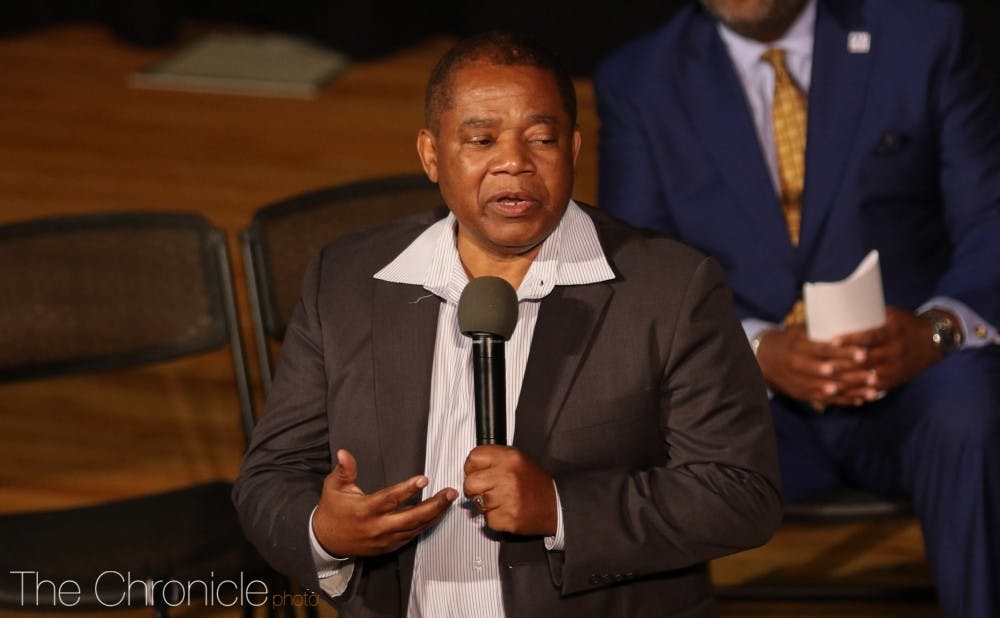Giving lower-income Durham residents more opportunities to succeed in life is the guiding force behind Sylvester Williams’ campaign to become the next mayor of Durham.
Williams—a pastor, East Durham resident and retired financial analyst for a Fortune 500 company—is no rookie to mayoral races. He unsuccessfully challenged then-incumbent mayor Bill Bell for the seat in both 2011 and 2013.
He has also served as chair for economic development for both the Durham Business and Professional Chain and the Durham Committee on the Affairs of Black People. During his time as chair, Williams negotiated a contract with Greenfire Development—a property management company in Durham—for 20 percent of jobs at the company to be set aside for African Americans.
“Here is someone who has the leadership and the metal to care for all of Durham, not just a sliver of it,” he said.
Affordable housing and economics
Williams compared the housing issues he encountered during his mission trips to those facing Durham today, noting that his platform from the 2013 election cycle hasn’t changed at all. He continues to push for more affordable housing across the city.
“I talk with people who say they cannot find safe, affordable housing in Durham, and our leaders ask the question, ‘Why can’t it be done?’ Well, if you [take more of our budget] and put it into the housing market, then maybe it could be done,” he said.
Williams also wants to create more job opportunities across the city to help reduce Durham's poverty and unemployment rates—currently at 17.1 percent and 4.1 percent, respectively. He explained that while investments have revitalized downtown Durham into a landmark tourist attraction, wealth has been unevenly distributed throughout the city, leaving some communities neglected.
“There are some parts of Durham where the unemployment rate is well over 30 percent," he said. “Why is that happening?”
Williams said that the possibility of another economic downturn like the Great Recession increases the value of his financial experience as a mayor. While the United States' economy has mostly rebounded from the recession, he said there are still several communities—including some in Durham—that were never really able to recover from the collapse of the housing market.
“If you don’t make it so that residents in less fortunate tracks of Durham are able to buy and spend in those tracks and we have another dip like we did in 2007-2008, then we’re going to have a very big problem,” he said.
Williams added that he doesn’t believe many of Durham’s current leaders have even explored the possibility of another economic downturn and he feels there are no other candidates in the race who can offer a similar perspective to his own.
Crime and inclusion
Williams praised Durham's police department, but said that in order to address the city's high crime rates, the city's next mayor should allocate more of the city's budget to hiring additional police officers.
"Our police department is fair and transparent," he said. "But why not bring in a greater police presence into the Durham area?"
When asked what he believes the people of Durham are looking for in their next mayor, Williams pointed to honesty, transparency and a willingness to deal equally with every resident. He noted that his experiences as a pastor and African American makes him more relatable and understanding.
Still, Williams has been criticized for his negative views toward the LGBTQ+ community. He has said that "civil rights do not apply to the bedroom" and that being transgender reflects having a mental problem. At a mayoral forum Monday, he commented on fellow mayoral candidate Shea Ramirez having a homosexual daughter.
But when asked about his views at a separate forum Sept. 14, he said that he is just transparent with his beliefs.
"Those issues are not resolved. It's not genetic," he said. "So if it's not genetic, why are some of these people having some of these problems and issues?"
Get The Chronicle straight to your inbox
Signup for our weekly newsletter. Cancel at any time.

